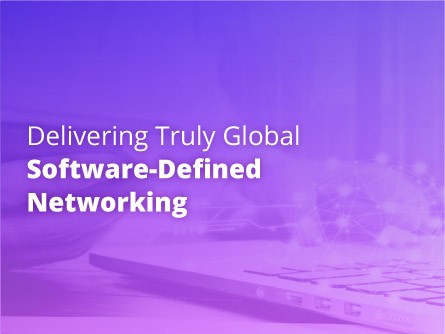Software-Defined Networking (SDN) has gained a lot of momentum across the globe over the last 12 months but many SDN services aren’t really global. Service Providers and Enterprises choosing an SDN provider tend to think of it as freeing them to turn up services anywhere and at any time but that isn’t always the case.
Today most SDN services are operated on small or fragmented islands. They offer centrally managed connectivity with all the elasticity and scalability but over a limited footprint. To maximise potential of SDN in their operations they need SDN to be truly global and go beyond what is being offered by many providers.
The market is growing too fast to limit services geographically. According to Markets and Markets, the global SDN market size was valued at $2.46 Billion in 2016 and is expected to reach $54.41 billion by 2022, at a CAGR of 71.4%. The demand is tremendous, and it means that SDN has to evolve.
Here are three things that will shape the future of SDN globally:
- Not All SDN Services are Equal – There’s a misconception that you “get some SDN” and that’s global networking solved. A lot of Service Providers that offer Platform-Orchestrated WAN services have limited network footprints.
You can centrally manage these networks but that doesn’t mean you can instantly turn up services across Asia, Africa or the Middle East. Service Providers and Enterprises have to choose providers that have a depth of infrastructure spread globally. That’s the only way to gain the full advantages of SDN. - Integrated APIs and the end of SDN Islands – Integrated APIs are enabling Automation and Programmability to go beyond traditional SDN islands and enable multiple Network Service Providers to offer a cohesive service across each other’s infrastructure.
Users can self-provision on-demand connectivity across different networks seamlessly. It extends their network reach while also adding new visibility into services beyond their home network, enabling business management decisions to be made faster and more effectively. - Shaping the Future with New Standards – As SDN demand grows globally, standards have to be put in place to ensure that federated networks don’t turn into continents of SDN, rather than just isolated islands. The Metro Ethernet Forum’s (MEF) Lifecycle Service Orchestration (LSO) is a great initiative that is supporting the growth of automation across global networking with a standards-based approach.
Choosing a SDN provider that is a MEF member and supporter of LSO is a way to future proof your SDN capabilities. MEF is taking a long-term approach to solving challenges in automation and interworking and supports SDN providers as they roll out new API integrations.
At Epsilon, we are expanding the density of our global footprint, adding new PoPs globally while also growing our relationships with partners and the MEF. We are focused on giving our partners access to truly global SDN services that remove barriers to their growth and give them new visibility and control.
As demand for SDN grows, we are opening our APIs to partners and providing seamless interworking to offer on-demand connectivity on partner networks. We’ve seen the beginning of SDN and now we want to take it into the future.







